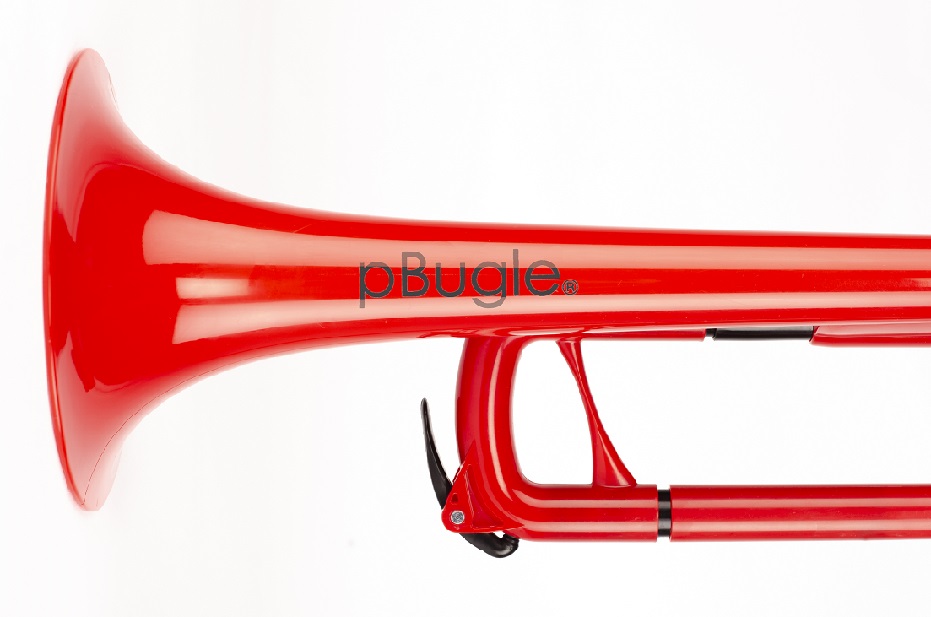

On the face of it, given Warwick Music Group’s (WMG) enviable track record in anticipating future trends in the education instrument market place, the arrival of the plastic pBugle to their stable of best-sellers seems to be a bit of an anomaly.
Then again it could well be yet another example of their cleverly inspired bits of thinking.
Take for example the unprecedented success of the humble plastic ukulele as the starter instrument of musical choice for children in primary schools.
It arrived with no discernible heritage of educational use in the UK, yet it created something of a revolution.
Cheap, bright and fun
Cheap, brightly coloured, easy to play and plenty of fun with friends in group teaching, in the last decade or so they have helped consign the ubiquitous recorder to the dark recesses of the hard-pressed time starved music teacher’s cupboard.
It is perhaps no coincidence that guitar sales in the UK topped 750,000 in 2015 and have been growing ever since.
With that in mind, the pBugle could also ensure they stay there for years to come and potentially help boost future brass instrument sales in the process.
However, the new pBugle is also cheap - coming in around £30; brightly coloured (red at present but with the possibility of other colours in future); easy to play (pitched in Bb, no valves and light - weighing only 250 grams) and plenty of fun to enjoy with a group of friends in the classroom or bandroom (if and when allowed).
George Formby
The traditional bugle has no great primary school education qualifications either (not in the UK at least).
However, the new pBugle is also cheap - coming in around £30; brightly coloured (red at present but with the possibility of other colours in future); easy to play (pitched in Bb, no valves and light - weighing only 250 grams) and plenty of fun to enjoy with a group of friends in the classroom or bandroom (if and when allowed).
All that and you don’t have to be a fan of George Formby either.
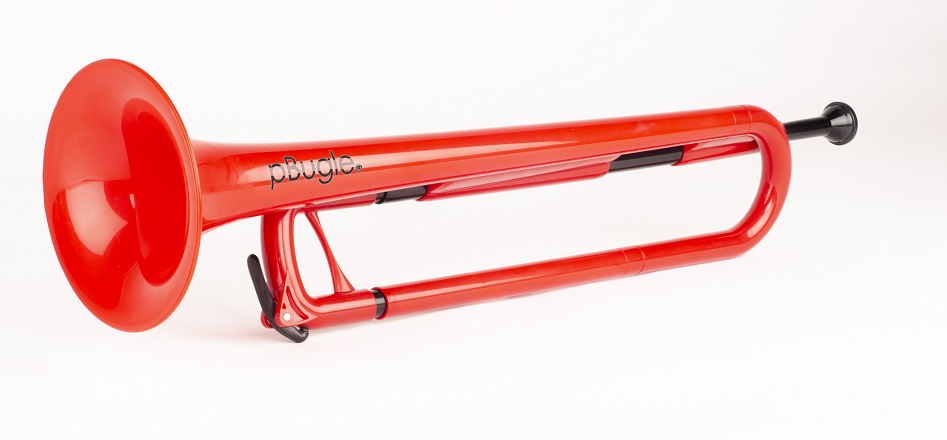
Made of the same ABS recyclable plastic as the pBone, pCornet and pTrumpet, it can take a fair old amount of battering (so it can be chucked into a school bag as it doesn't come in a case), has the minimum of parts to worry about fiddling with or losing (the tuning slide seems unnecessary, but the waterkey does it’s job), and is easy to keep hygienically clean.
Lineal progression
The clever bit of thinking behind it though hasn’t been the simple design and easy to use ergonomics (it also comes with a plastic 7C mouthpiece): It’s all about lineal progression – and getting the basics of playing put firmly in place.
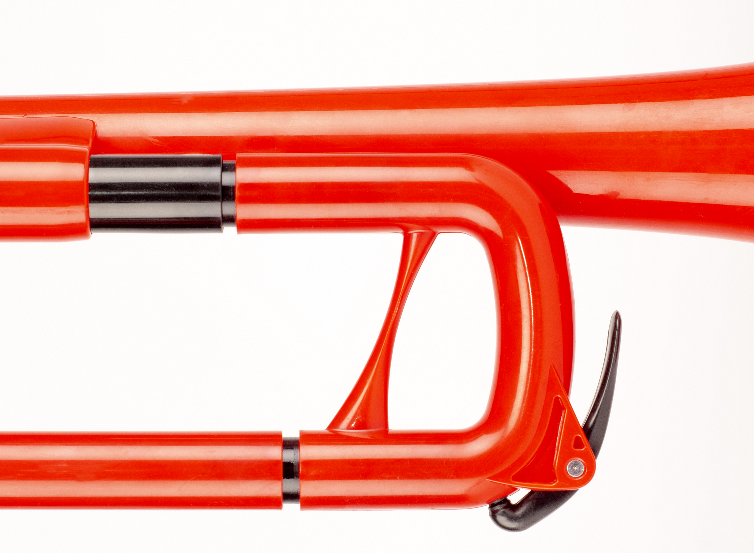
Basics right
In that respect it follows the clever example of the ukulele and more pertinently, WMG’s own pBuzz and pBone mini trombone and pBone.
Get those playing basics right and move on; adding to the skills sets (more slide positions, adding valves etc) as you progress.
It enables a child to make quick, sustainable progress – and in this respect, from pBugle to pCornet or pTrumpet and hopefully, full brass or even hybrid pTrumpet hyTech.
It enables a child to make quick, sustainable progress – and in this respect, from p-Bugle to p-Cornet or p-Trumpet and hopefully, full brass or even hybrid p-Trumpet hyTech.
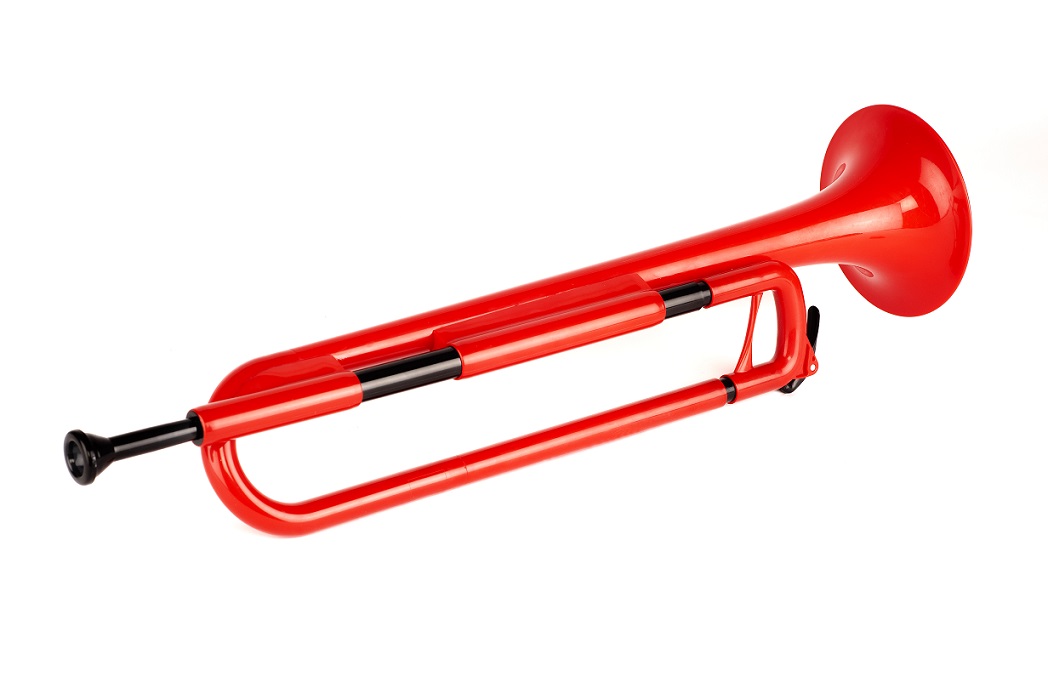
Key thinking
The key then is to understand Warwick’s thinking behind how an inquisitive child can first enjoy making a sound, then some notes on an instrument that is easy to play – by themselves, or in a group, and once enthused and hooked, start building on things.
To start with, learn to produce identifiable notes (basic tonic bottom C, dominant G etc of the harmonic series) with the correct embouchure, alongside adding rhythms and basic patterns with friends.
The key then is to understand Warwick’s thinking behind how an inquisitive child can first enjoy making a sound, then some notes on an instrument that is easy to play – by themselves, or in a group, and once enthused and hooked, start building on things.
All you have to do is pick it up, clasp you hand around the mid-point casing, put it to your lips and blow.
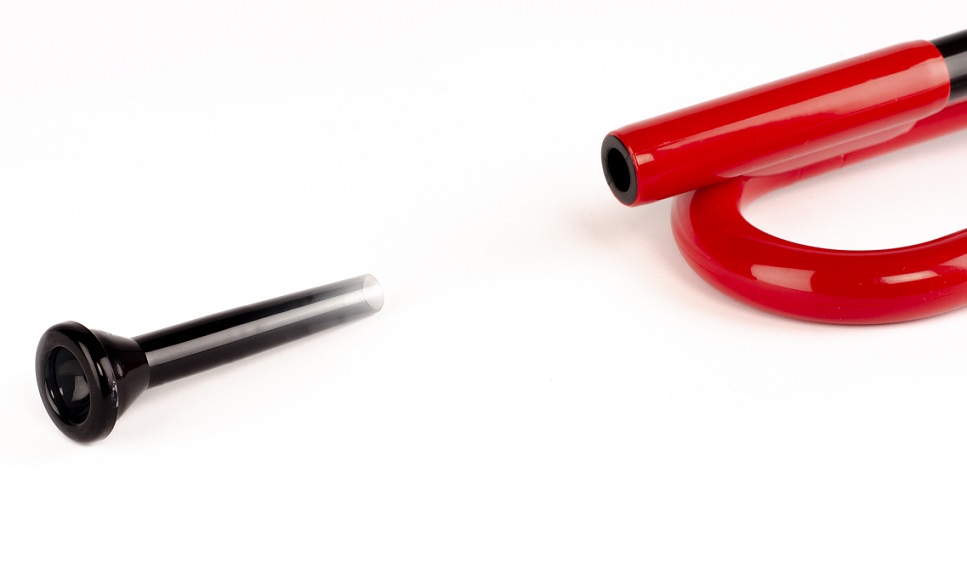
Accompanied by an enthusiastic, inspiring teacher and you will soon have a whole platoon of ‘Boogie-Woogie Bugle Kids from Classroom B’ on your hands.
Learning to play the pBugle is quick and easy, can be noisy and chaotic (which any group of children love) and everyone can progress together.
It is hopefully the start of a journey that will result in a lifetime’s enjoyment of playing brass/instrument instruments - leading to the next WMG instrument in the chain.
It is hopefully the start of a journey that will result in a lifetime’s enjoyment of playing brass/instrument instruments - leading to the next WMG instrument in the chain.
Video instruction
And just to help things along, Warwick produces easy to follow on-line video instructions and support resources for its instruments – including the pBugle.
There is a blog on why they made it in the first place (https://blog.pbone.co.uk/why-did-we-make-the-pbugle); testing the instrument (https://blog.pbone.co.uk/testing-the-pbugle-a-case-study) and how a test group of primary school children got to grips with using it (https://www.youtube.com/watch?v=6yxTSC_SN_8&feature=youtu.be)

Anomaly?
In addition the pBugle page of the WMG website also covers care and maintenance, the difference between a pBuzz and pBugle and even a blog that talks about some of the questions about buying and using a plastic instrument.
The pBugle may well seem something of an anomaly – and it may take a while for it to find its niche.
However, given the price, the simplicity of the design and the lineal thinking behind it as a starter instrument to lead into an ongoing musical progression, it really is a clever bit of thinking…
Specifications:
Price: Approx £30.00
Pitch: Bb
Weight: 250 grammes
Bore: .459”
Colour: Red
7c plastic mouthpiece
Tuning slide with waterkey









